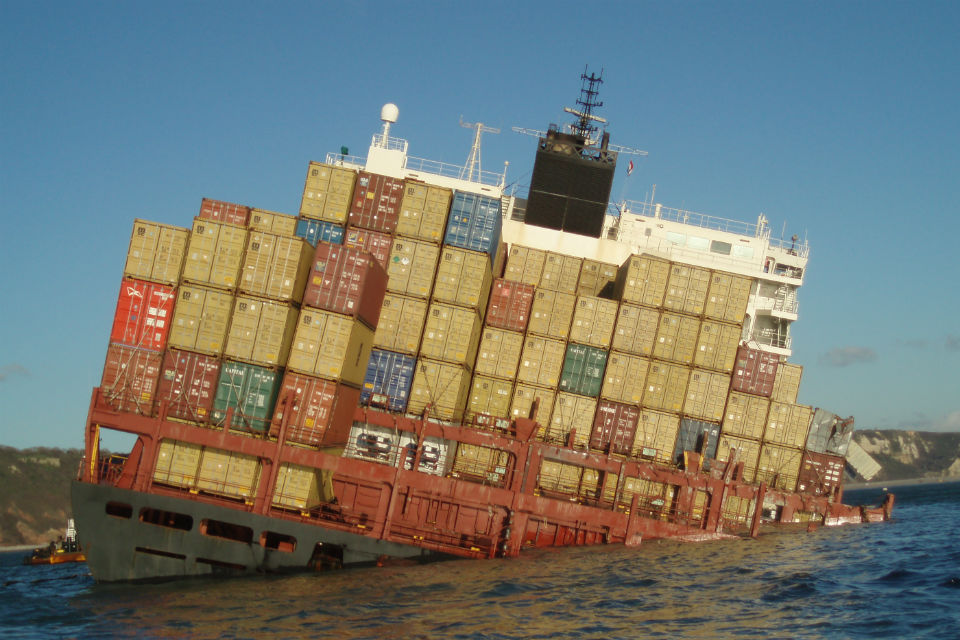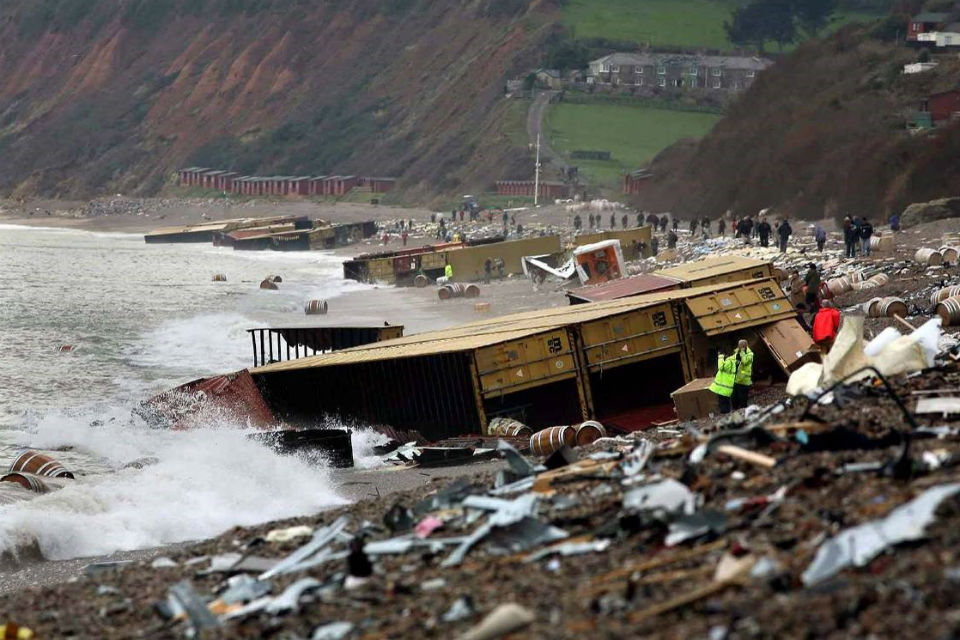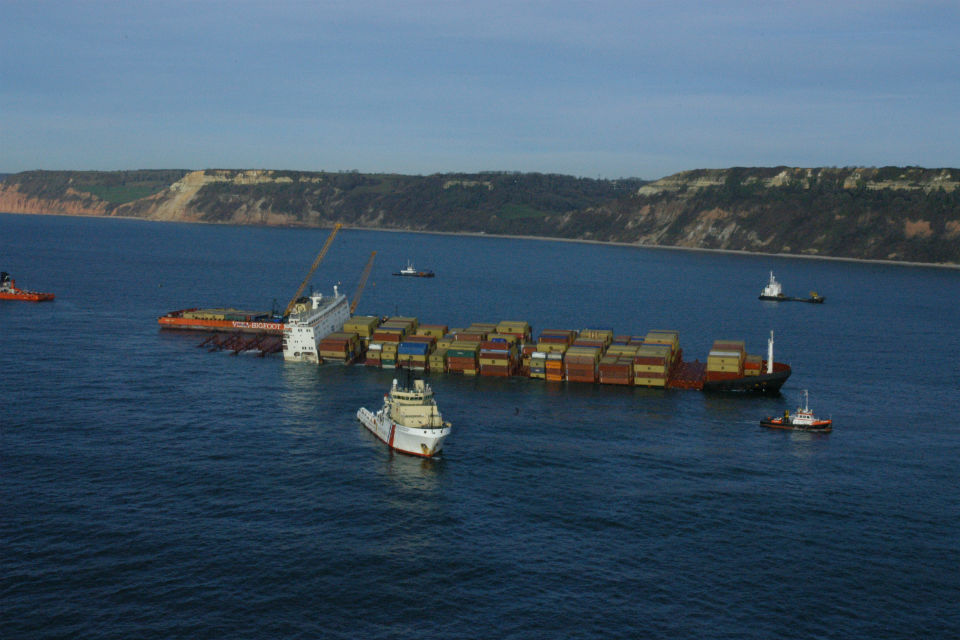Tenth anniversary of the MSC Napoli shipwreck disaster
When a storm forced the MSC Napoli ashore at Dorset's Jurassic Coast, it was the start of a 拢120 million salvage operation lasting 924 days.

Onlookers watch the MSC Napoli from the shore of Branscombe Bay in Dorset. Photo: Maritime and Coastguard Agency
It was a nightmare scenario 鈥� a huge container ship heading down the English Channel is severely damaged in a storm and forced to come ashore on Dorset鈥檚 famous Jurassic Coast 鈥� a World Heritage Coastline. 皇冠体育app prospect didn鈥檛 bear thinking about.
But that鈥檚 what happened on 20 January 2007, in a memorable maritime event that put the coastal village of Branscombe firmly on the map and sparked a major international multi-agency recovery and salvage operation that took two-and-a-half years to complete.
皇冠体育app drama began on 18 January, when the Napoli, a 62,000 tonne container ship enroute from Antwerp to Durban, South Africa, ran into a violent storm off Britanny. 皇冠体育app ship put out a distress call after suffering 鈥榗atastrophic damage鈥� to its hull. All 26 crew were airlifted to safety in a rescue operation co-ordinated by UK coastguards.
Force 11 northerly winds made it impossible for the vessel to shelter along the French coast, so the French government asked the UK government if the crippled ship could be towed across the Channel into UK waters. 皇冠体育app Napoli was still afloat, but listing badly.

A storm cracked the hull of the MSC Napoli, which was evacuated by its crew. Photo: Maritime and Coastguard Agency
皇冠体育app ship was carrying 2,300 containers and 3,800 tonnes of oil. Its assorted cargo included explosives, fertiliser, weedkiller, car engines, chocolate, Polish bibles, vodka, shampoo, wine, coffee, perfume, dog biscuits and frozen ducks.
With the storm showing little sign of abating, the UK government gave permission for the stricken vessel to be brought into territorial waters. 皇冠体育app initial plan was to tow the ship to Dorset鈥檚 Portland harbour. But because of the risk of it sinking, it was decided to bring the vessel into the sheltered waters of Lyme Bay where it could be beached near Sidmouth.
So on the morning of 20 January 2007 the Napoli finally came ashore off Branscombe, the crack in her hull clearly visible near the ship鈥檚 bridge. Within hours, the latest 鈥榲isitor鈥� to Dorset鈥檚 Jurassic Coast was front page news and thousands of sightseers descended on the picturesque village of Branscombe to get a close-up look at the vessel.
As the sheer scale of the operation became apparent, the government launched its National Contingency Plan for Marine Pollution. 皇冠体育app Maritime & Coastguard Agency established a Salvage Control Unit (SCU) to deal with the salvage operation and a Marine Response Centre (MRC) to manage the pollution response at sea.
Meanwhile, an Environment Group was hastily convened to minimise the environmental impact of the incident and help co-ordinate a land-based response. Organisations represented on the group included the Environment Agency, Natural England, Health Protection Agency, Centre for Environment, Fisheries and Aquaculture Science (CEFAS) and the RSPB.
皇冠体育app decision to deliberately beach the stricken ship off East Devon was taken by the Secretary of State鈥檚 Representative for Maritime Salvage and Intervention (SOSREP). An inquiry later concluded it was a correct decision as it almost certainly averted a 鈥榩ollution catastrophe鈥� in the Channel.
Not all sightseers were happy to simply look at the beached vessel. Containers lost from the deck of the Napoli started being washed ashore prompting the arrival of hoards of people from all over the UK intent on scavenging cargo. Boxes of shampoo, wine barrels and even BMW motorcycles, still in their packing crates, were manhandled off Branscombe beach by an army of modern day 鈥榳reckers.鈥�
皇冠体育app disruption and disturbance to the normally peaceful village of Branscombe was made worse by narrow country lanes that soon became clogged with vehicles arriving to remove valuable items of cargo from the container strewn beach.
Chief Superintendent Jim Nye, who was the Silver commander at the time of the incident, said:
皇冠体育app beaching of the Napoli gave a unique challenge to emergency services and other agencies involved in the rescue and salvage operation.
From the outset, the primary aims of the police were public safety and to support the lead agency, the Maritime and Coastguard Agency (MCA). Following the introduction of the Civil Contingency Act in 2004, practices have significantly improved to what they were 10 years ago. We strive to continuously improve and learn from such incidents by working in partnership through the Local Resilience Forum.
Our contingency planning is much more developed now and we believe that if a similar incident should ever happen again, we would be in a much better position to work with our partners to effectively deal with it and maintain public safety at all times.

Eighty of the MSC Napoli's 2,318 containers washed ashore. Photo: Environment Agency
Media interest reached fever pitch with TV crews and journalists bombarding the SOSREP, Environment Group, Maritime and Coastguard Agency (MCA) and Police for interviews.
To cater for the unprecedented level of interest, an international media event was held in Sidmouth the day after the grounding where journalists鈥� interest switched from potential pollution by oil to the ransacking of cargo. Chair of the Environment Group, Julian Wardlaw, from the Environment Agency, did 11 media interviews in two hours including two in French.
First priority was to remove 3,800 tonnes of diesel, bunker fuel and hydraulic oil from the Napoli. 皇冠体育app ship had lost approximately 10 tonnes of oil shortly after arriving off Branscombe beach, but favourable winds blew most of it offshore. 皇冠体育app cargo absorbed a lot of oil - dog biscuits lost from one of the ship鈥檚 damaged containers, proved particularly effective!
Salvage experts worked round the clock to remove oil from the vessel. Divers drilled into the hull and emptied oil from all of the ships fuel tanks within eight weeks of beaching. 皇冠体育app salvage operation was helped by fine weather.
Inevitably, some oil did escape and over the following weeks 1,000 seabirds were collected and sent to the RSPCA for treatment. Six hundred were later released after being cleaned and nursed back to health. An estimated 302 tonnes of oil was lost during the incident. Most was carried eastwards and was washed up on local beaches 鈥� some up to 20 miles away.
A total of 114 containers were lost from the deck of the ship. Eighty were washed ashore. Most were later recovered.
皇冠体育app Environment Agency and CEFAS carried out monitoring throughout the salvage operation to check for signs of pollution and assess the environmental impact in the sea and surrounding coastline. Cargo from broken containers, especially lighter plastics, were carried on tides as far as East Sussex.
皇冠体育app second stage of the salvage operation involved the removal of containers from the Napoli. A full assessment was made of the cargo that included 159 containers of dangerous goods. Large cranes were brought over from Holland on a barge. 皇冠体育app containers were then taken by barge to Portland for assessment, recycling or disposal. Attention turned to the ship once all the oil and cargo had been removed.
By the summer of 2007 it was decided to try to re-float the Napoli. Although it was successfully re-floated, the vessel was too badly damaged to be towed so it was dismantled instead using explosives to separate the bow section from the stern.

All the fuel was drained from the MSC Napoli, the cargo removed and eventually it was cut in two with explosives. Photo:Maritime and Coastguard Agency
皇冠体育app bow section was towed to Harland and Wolff shipyard in Belfast for final dismantling while the stern was left at Branscombe to be dismantled in situ. 皇冠体育app wreck was battered by winter storms in 2008, but was eventually cut up and taken by barge to Rotterdam.
A scan of the seabed showed that by July 2009, every last trace of the Napoli had been removed. 皇冠体育app whole operation had taken two-and-a-half years. Total cost of the incident was in excess of 拢120 million.
皇冠体育app multi-agency Environment Group was later praised by the Napoli鈥檚 owners and other responders for its effectiveness and reactive approach.
Reflecting on events of 10 years ago, Julian Wardlaw from the Environment Agency, who chaired the Environment Group, said:
皇冠体育app grounding of the Napoli was such an unusual event we had to be very innovative. We were fortunate in that the Environment Group was well supported by its partners, especially the MCA, Natural England and Public Health England.
It meant, in the first two weeks, we could meet almost continually to help manage the incident as it unfolded.
At a subsequent inquiry into the Napoli, Julian Wardlaw said he supported the decision to deliberately ground the stricken container ship off the East Devon coastline describing it as the 鈥榣east worst option.鈥�
Hugh Shaw, the current Secretary of States Representative (SOSREP) said:
Fortunately, shipping incidents as serious as the Napoli are rare within UK waters. 皇冠体育app scale of the response and resources required to salvage this ship were immense.
皇冠体育app strategy was unusual in that we deliberately grounded the ship in Lyme Bay to mitigate against a potentially far more serious situation. Once the vessel was in the shallow, sheltered waters of Lyme Bay, the salvage operation was infinitely more manageable.
As with all shipping incidents in UK waters, we make every effort to protect the environment, and the Napoli was no different. Failure to take action would have led to a significant risk of the vessel sinking in the open seas of the English Channel which could have led to long term environmental consequences as well as navigation safety issues. Importantly there was no loss of seafarers鈥� lives during the incident.
Thankfully, no UK shipping incident has come remotely close to this timescale in the 10 years since Napoli.
皇冠体育app Napoli set a benchmark in maritime incidents and is used by the MCA in training exercises to demonstrate how best to respond to maritime and coastal emergencies and safeguard the public and environment.
In total, the recovery and salvage operation lasted 924 days.
Councillor John Hart, Leader of Devon County Council, said:
皇冠体育app grounding of the MSC Napoli was arguably a turning point that prompted a change in the way such incidents are dealt with by the authorities.
Initial confusion over who鈥檚 responsibility was what, led to the authorities playing catch-up to some extent as thousands of people descended on Branscombe to pick through the containers鈥� contents as they were washed ashore.
Devon County Council helped fund a special report that formed the basis for action and lobbying to ensure local authorities were better placed to deal with any future shipping incidents. And it was this work, by the Local Government Association, that played a vital part in the development of a 鈥楥ross-Channel Declaration on Shipping Incidents鈥� to reduce the risk of acute pollution events.
Devon County Council took a lead role in helping secure the signatures of this declaration by many coastal authorities in England and France.
Councillor Hart said:
Declarations and changes in policy do not mean incidents like the MSC Napoli will not happen again, but the debate that followed means emergency services and local authorities are now better placed to respond quickly and with greater efficiency.
皇冠体育app joint workings today between members of the Local Resilience Forum are testimony to that cooperation and have been tested numerous times since with emergencies such as flooding.
On the 10th anniversary, it is also a time to remember the many local volunteers who, alongside the local councils and agencies, worked hard to return this iconic stretch of coastline back to its former beauty for the enjoyment of everyone.